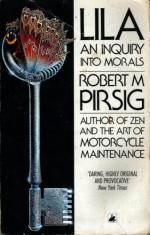|
This section contains 658 words (approx. 2 pages at 400 words per page) |

|
Lila: An Inquiry Into Morals Summary & Study Guide Description
Lila: An Inquiry Into Morals Summary & Study Guide includes comprehensive information and analysis to help you understand the book. This study guide contains the following sections:
This detailed literature summary also contains Topics for Discussion and a Free Quiz on Lila: An Inquiry Into Morals by Robert M. Pirsig.
Lila: An Inquiry into Morals by Robert Pirsig is the follow-up book to Zen and the Art of Motorcycle Maintenance. In this second volume, Pirsig moves beyond the ideas that he illustrates in his first novel to explore these concepts even more deeply. The book is the story of the main character, Phaedrus, a very thinly veiled version of Pirsig himself, sailing up the Hudson river with his newly acquired passenger, Lila. Juxtaposed with the story is Phaedrus's philosophical narrative, as he explains the piece of persuasive literature he is writing. He explains that this project originates with his friend, Professor Dusenberry, and a peyote-induced vision quest ceremony on an Indian reservation. Phaedrus begins studying the field of anthropology in hopes that his ideas can be heard, only to realize that the field of anthropology is set up in such a way as to reject ideas such as his own. He decides instead to operate under the umbrella of Metaphysics, where his concepts can truly blossom and flourish in any direction they choose. In essence, Phaedrus comes to realize that he is going to have to chip away at the very foundations of science and philosophy in order to be heard and that he is the best man to tackle such a mammoth undertaking.
According to Phaedrus, the universe is divided up into the "static" categories biological, inorganic, social and intellectual. The opposite of static quality is "Dynamic Quality," which cannot be defined. Phaedrus's ideas are attacked by "devil's advocate" character Richard Rigel whom Phaedrus determines to be steeped in Victorian idealisms. Phaedrus sails on with Lila while pondering not only Victorian ideals, but the progression of our culture from the time of the Victorians, through the World Wars, the Hippie revolution and up to present day.
In the meantime, Pirsig is telling the story of Lila, the woman whom Phaedrus picks up in a bar in Kingston, and who is experiencing a mental breakdown. Phaedrus, who has had his own experiences with insanity, ponders the concept of sane versus insane in light of his exposure to Lila. Phaedrus and Lila dock in Manhattan and are thrust into the chaos and corruption of the city. Phaedrus meets with Robert Redford to discuss the movie rights for his first book, and also with his publisher while he is in town. Things do not go well for Lila once she is separated from Phaedrus, and she spirals further down into her alternate reality. She eventually makes her way back to Phaedrus's boat, where he finds her in a catatonic trance, cradling a baby doll that she has fished out of the river. Phaedrus realizes that he is going to have to take care of her, a fact that he first resents but then later comes to accept. After some drama with an old acquaintance of Lila's, she and Phaedrus leave Manhattan for Sandy Hook, a harbor up the Hudson River.
Richard Rigel meets up with them there, and Lila decides to leave Phaedrus's boat and travel with Rigel instead, which is actually what her goal has been all along. Rigel tells Phaedrus that Lila claims Phaedrus is trying to kill her. Rigel also reveals that he has been Lila's obsession for some time now, and that she chased him all over the state of New York. Phaedrus is in a state of shock over Lila's immoral lie and her sudden departure. Once she is gone, however, Phaedrus is able to find closure of the "Lila" chapter of his life, and experiences a profound feeling of freedom and a fresh start. He buries her doll, which she leaves on the boat, and debates whether or not he will begin where he left off on his project. He decides to return to the idealisms of the Indians in order to simply sum up the crux of his theory—that "good" is a noun rather than an adjective.
Read more from the Study Guide
|
This section contains 658 words (approx. 2 pages at 400 words per page) |

|



